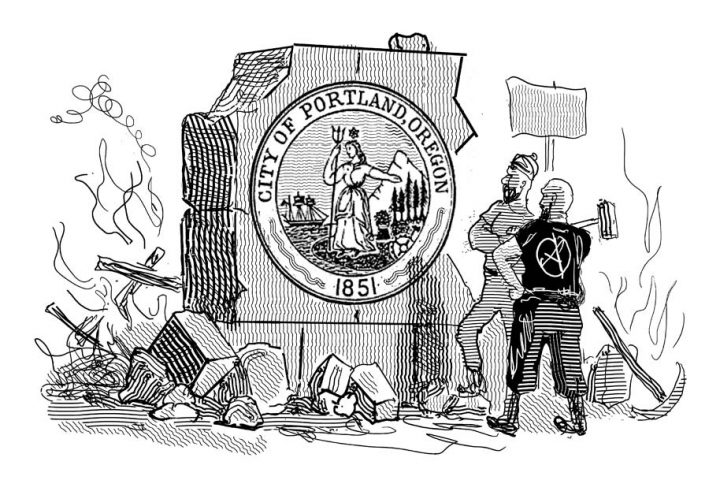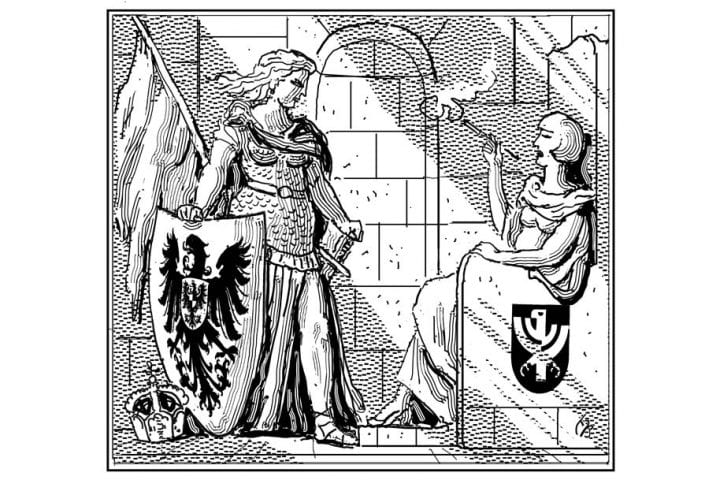Books Reviewed
I first met Andy Ngô on August 4 of last year at the Dirksen U.S. Senate office building. We were both appearing before the Senate Judiciary Committee to testify about the group of masked radicals known as Antifa. I found it hard to conceive that this short-statured, soft-spoken son of Vietnamese refugees was Antifa’s public enemy #1.
I knew Andy’s work as a journalist well. Like others who followed his viral live videos on Twitter and other streaming platforms, I had seen him face brutal attacks on camera. For anyone who watched the 2020 riots tear American cities apart, Ngô and his work loom larger than life. To lovers of American liberty, he is practically a folk hero. To Antifa and its sympathizers, he is a pariah. But in person, the man is gentle and unassuming. During the Senate hearing, he seemed almost naïvely disappointed to discover that most of our lawmakers were more interested in partisan grandstanding than in the real information he so urgently wanted to provide. Andy Ngô is not a political operative, or a radical. He is certainly not a fascist. He is a man who believes in the truth.
Ngô serves as editor-at-large of the popular conservative website the Post Millennial. For merely daring to walk among Antifa’s apparatchiks as they brutalize Americans, and for putting the carnage on film, Ngô has been doxxed, harassed, threatened with death, and viciously assaulted. One attack left him with a serious brain injury. Harrowing images of his bruised and battered face often circulate online. Yet for all this, he has never so much as lost his temper. He remains quietly resilient, refusing to indulge in open hatred toward the violent thugs who have persistently tormented him. Instead, he is simply determined to inform the public, using documentary evidence, about what Antifa really is. That is the one thing these black-clad anarchists cannot abide.
* * *
In his new book, Unmasked: Inside Antifa’s Radical Plan to Destroy Democracy, Ngô hopes to show the wider world what he has uncovered about Antifa, and at what cost. This is a careful exposé, illustrated with photos and research from the author’s own reporting. It is aimed at the kind of reasonable, non-partisan audience that Ngô hoped for, but did not find, at the Senate hearing.
The information in Unmasked will sit uncomfortably with both political parties. The Democrat posture on Antifa remains classic doublethink: Antifa does not exist, and also its members are heroes. Ngô is trying to get Democrats to come to terms with the basic reality that—contra Joe Biden—Antifa is far more than a mere idea. But many Republicans and conservatives are also unwilling to face the situation head-on. Some on the Right mock Antifa rioters as degenerate “soyboys” who would be easily dispatched if law enforcement were allowed to do their job. Still others seem to attribute to Antifa capabilities more analogous to those of the feudal Japanese ninja—able to be anywhere and accomplish almost any act of violence or sabotage.
To correct these various caricatures and distortions, Ngô offers what may be considered a remedial education in the history of Antifa. He does an excellent job. Antifa originated in street clashes between Communists and fascists in mainland Europe. Thus Ngô begins with the rise of a group called Antifaschistische Aktion in the turbulent streets of Weimar Germany. Serving as the street-fighting arm of Germany’s Stalinist Communist Party, this original Antifa battled with both Nazi brownshirts and members of the Social Democrats, then the dominant mainstream party. As Ngô explains, the “anti-fascists” helped perpetuate the revolutionary chaos through which the Nazi Party would eventually march to power. In that sense they ushered in their own defeat, at least in Germany for the time being: under Hitler, Antifa was effectively suppressed.
* * *
But the group would reemerge after the war, only to be subsumed into the East German state as part of its official enforcement apparatus. Ngô describes East Germany as a kind of archetypal “Anti-fascist” end state, justifying extremes of oppression and surveillance in the name of fighting whatever it deemed “fascism.” The East German Stasi also promoted “anti-fascist” movements in West Germany, giving rise to several of the urban Communist organizations of the 1970s. These included the Red Army Faction, which terrorized Western Europe during this period. In Britain, a copycat group, Anti-Fascist Action, joined forces with punk rockers in their street battles against the “skins,” or skinheads. Ngô writes, “[A]ntifa’s cross-pollination with British punk music and punk culture…was a lasting influence that aligned the ideology toward anti-authoritarianism and anarchism.”
One crucial step is missing from Ngô’s account: in 1980s Germany, Antifa honed new tactics as it took part in clashes between police and student squatters. These squatters were devotees of autonomism, an anarcho-Marxist ideology influenced by the previous generation’s Communist guerillas. German Autonomen were the pioneers of the now-infamous “black bloc” street-fighting tactics, in which rebels would block off and then passionately defend their self-styled “autonomous zones.” Black bloc action remains the basis for Antifa’s modern campaigns, as exemplified in the notorious Capitol Hill Autonomous Zone (CHAZ) in downtown Seattle in the summer of last year. This strategy is what allowed Antifa to transfer effectively into the British cities, and from there to the United States.
Thus Antifa jumped the pond and took up residence in the American punk scene. Ngô is anxious to find something distinct in this American version of Antifa, which he describes as a “mutation.” Up to a point, he is correct: the American Left’s focus on race and gender, as opposed to class, makes Antifa in America a slightly different beast than its European counterparts. But race and gender are not new obsessions for the Marxist Left: Antifa in America borrowed this approach from radical groups that took shape in the ’60s and ’70s. Conflicts over social issues repeatedly led to infighting in these “New Left” organizations. In nearly every case, the most race- and gender-obsessed factions survived, while others were purged. One of the last groups to continue the fight was the May 19th Communist Organization, a radical feminist-led collective which robbed banks and planted bombs in cooperation with the Black Liberation Army and Puerto Rican Fuerzas Armadas de Liberación Nacional (FALN) in the early 1980s.
* * *
The May 19th Communist Organization and its front group, the John Brown Anti-Klan Committee (JBAKC), played not merely a theoretical but an operational role in the creation of modern Antifa. As Hilary Moore and James Tracy document in their pro-JBAKC history, No Fascist USA! (2020), JBAKC pioneered confrontational “antifa tactics” against the Klan and various neo-Nazis. Eventually, JBAKC reached out to American punk rockers and enlisted the next generation of “anti-fascist” fighters. Susan Rosenberg, a JBAKC co-founder and convicted May 19th terrorist, had her sentence commuted by President Bill Clinton to time already served and sits on the board of Thousand Currents, the group which handled fundraising for the Black Lives Matter movement.
Having chronicled Antifa’s anarcho-Communist history, Ngô is at pains to explain that this radical group has no truck with traditional Left-liberals of the kind who once prevailed in the Democratic party. Describing the political atmosphere of CHAZ, Ngô writes:
Tellingly, there was no Democratic Party presence at CHAZ. As leftward as the Democrats have swung in reaction to Trump, the party is still viewed as too moderate for the revolutionaries who want the abolishment of police, capitalism and the United States itself.
Antifa’s members view the entire American system and way of life as evils to be destroyed. Immediately after the November 2020 election, Antifa banners displayed slogans like “Death to Fascism, and the Liberalism that enables it” and “We don’t want Biden, we want revenge.” But if Antifa radicals have no love for mainstream Democrats, the reverse is certainly not true: Ngô notes multiple examples of the party playing footsie with the violent domestic terrorists who help intimidate the party’s opponents. Democrat congressmen frequently cite Antifa talking points, and some staffers participate in actual riots. “Now, not only are large factions of the left sympathetic to antifa violence,” writes Ngô, “some are actively working to suppress their opponents through getting corporate businesses and Big Tech to ban them.” The Left’s reception of Unmasked has proven his point: anyone who dares express an interest in hearing what Ngô might have to say has been demonized. Winston Marshall, lead guitar and banjo player from the hit folk band Mumford & Sons, tweeted innocently that he found Ngô to be a “brave man.” For this, he was promptly lambasted online and forced to leave his band.
* * *
It is perhaps one of life’s ironies that Andy Ngô finds himself facing off against the ideological descendants of the very Communists who forced his family to flee Vietnam mere decades ago. Ngô’s brief examination of his family history is perhaps the most touching—and revealing—element of Unmasked. Antifa’s supporters delight in casting aspersions upon Ngô’s motives, as though some perceived fame or fortune could possibly be worth the violence and harassment he’s received at their hands. But in telling the tale of his parents’ flight from oppression to the land of the free, Ngô reveals how he sees his efforts to expose Antifa: he is defending the America his parents fought so hard to reach. That America, the one to which the Ngôs fled, honored free speech and maintained the rule of law. Ngô is heartbroken to see those values under siege: he is trying, desperately, to shake Americans out of their complacency and warn them of what happens when fanatical groups like Antifa are allowed to take control.
As an analyst, I found myself hungry for more about Antifa’s organization, network, and ideology than Ngô is able to provide in a single book aimed at a general audience. But Unmasked is successful at achieving the very thing that earned Ngô his position at the top of Antifa’s most wanted list. He fairly reports the truth about Antifa and their violence, with evidence from the ground. Whenever possible, he names names. That does indeed make him a brave man.




